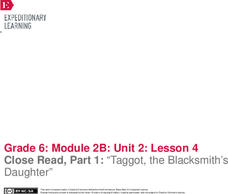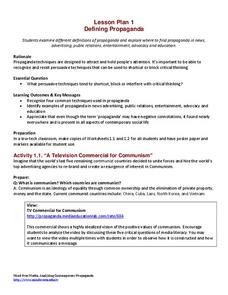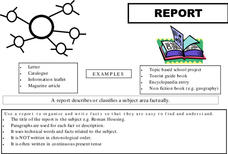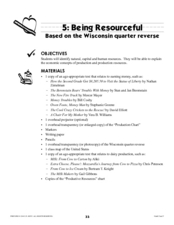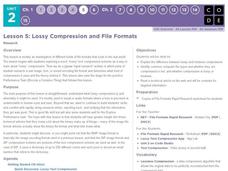Lawrence Virtual School
Context Clues
Considering a lesson on using context clues to figure out the meaning of unfamiliar words? This packet includes a brief reading passage about strategies readers can use and 12 very different graphic organizers, including a template for a...
Institute for the Professional Development of Adult Educators
Using Context Clues with Signal Words
When you come across an unfamiliar word in a text, do you skip it and move on? Practice using context clues to identify words you don't know with a thorough set of language arts lessons. The resource reinforces close reading and critical...
National Institute of Open Schooling
Chemical Equilibrium
Le Chatelier's interest in thermodynamics and building materials such as cement and plaster led to the Le Chatelier Principle in 1884. Activity 13 in a series of 36 extensively explores chemical equilibrium. Learners read about...
EngageNY
Close Read, Part 1: “Taggot, the Blacksmith’s Daughter”
There would be no luck if it were not for bad luck. Scholars take a close look at the theme of adversity through multiple reads of Taggot, the Blacksmith’s Daughter. They place sticky notes on important details of the story and complete...
Media Education Lab
Defining Propaganda
21st century learners live in a media world. Help them develop the skills they need to be able to analyze the barrage of propaganda they face daily, with a resource that introduces them to the type of persuasive appeals found in...
Curated OER
What's Wrong - Intensive Reading
There are different types of reading meant for different texts. Discuss four of these with your emerging readers. When does one perform an extensive or intensive reading? When does one skim or scan a text? How are these all different?
Curated OER
Non Fiction Posters
A set of very useful posters (in PDF) describing different types of non-fiction texts is here for you. While there isn't an activity, per se, in these worksheets, they could be used as a handy reference for learners who are engaging in...
Curated OER
Locating And Utilizing Information Using The Internet
Third graders practice typing in a web address to find a specific web page and how to use a search engine to locate specific information. They access a search engine to locate information about geology to answer the questions on a quiz.
Curated OER
Being Resourceful: Wisconsin quarter reverse
If your class understands goods and services then they'll be ready for this lesson on various resources. After reading a series of books and engaging in class lecture and discussion, pupils will fill out worksheets. They will list...
Curated OER
Safety And Water Safety
Young scholars investigate the concept of safety in and out of the water. They conduct research using a variety of resources. Students focus upon the role of police officers in the keeping of safety and then discuss the different types...
Curated OER
Three Ways to Name an Angle
Learners first name angles in three ways, then classify them as acute, obtuse or right angles. Good practice when introducing the concept of different types of angles.
Curated OER
Berlioz the Bear
Young children read the story, Berlioz the Bear and complete various reading and writing activities. They learn about fiction and non-fiction, and complete graphing and writing activities for the story. Youngsters draw the bear and use...
Curated OER
Learning the Basic Levers...One, Two, Three: Different Basic Arrangements Levers
Fifth graders read information about levers. They complete worksheets to summarize their learning. This activity relies heavily on the Silver Burdett Ginn text, Science Discovery Works, Energy, Work, and Machines. The activity will not...
WeTransfer BV
Paper by FiftyThree
There is no such thing as someone who is not artistic when using this app. In fact, this is the type of app that makes you want to go out and buy a tablet computer. Whether you have a creative lesson planned, or just need a place to take...
Curated OER
Deduction
Students investigate the linguistic devices used by writers to create meaning. In this writing lesson, students discover why writers write in different ways showing examples of different types of text. After reading each type students...
Curated OER
Comparing and Contrasting-Grassland, Desert, and Forest Elephants
Learners compare and contrast different types of elephants. In this environmental science instructional activity, students examine the characteristics of three species of elephants. Learners view a video of each type of...
Google
Google Translate
Not sure how to translate a word, phrase, or paragraph? No worries. Simply paste in, type, or dictate your text, select the initial and desired language, and up pops your translation. Better yet, the app will read the text to you in most...
Novelinks
Touching Spirit Bear: Question Answer Response Strategy
What types of questions help readers learn the most? Sixth, seventh, and eighth graders learn how to ask four types of questions from the Question Answer Response (QAR) reading strategy to help grow their comprehension of Touching Spirit...
EngageNY
How to Write Like a Scientist in the Field: Introduction to the Elements of Field Journals
It's time to start journaling. Scholars look at examples of science field journals. They work in pairs to examine and complete a note catcher about a field journal. They then add to an anchor chart by discussing the different features...
Code.org
Lossy Compression and File Formats
I'm compressed. Groups do a rapid research of different file types to determine what kind of compression the formats use and how it works. They share their information with the rest of the class until everyone has all the information for...
Science Matters
Energy Transfer and Transformation
When you take a simple task and create an exceptionally difficult way to complete it, it is known as a Rube Goldberg machine. These machines are filled with many types of energy transfers and energy transformations. Here, pupils...
Code.org
Bytes and File Sizes
A bite of bits. The first activity in a unit of 15 introduces the class to the byte. Pupils learn about other standard units for measuring file sizes, develop an understanding of relative sizes and the kind of units used to measure...
Qrayon
Inkflow: Think Visually!
Save trees! Save graphite! Save ink! Go paperless! Make a list, mindmap, sketch an idea. Import, scale, rotate, and add text to images. Save content into books and share your creations. All this and more is yours with a free visual...
K12 Reader
Rainforest Ecosystems
Rainforests are the topic of this brief reading passage. Learners can find out all about the different layers of the rainforest as well as the types of creatures that live there. After reading, they respond to five questions about the text.



